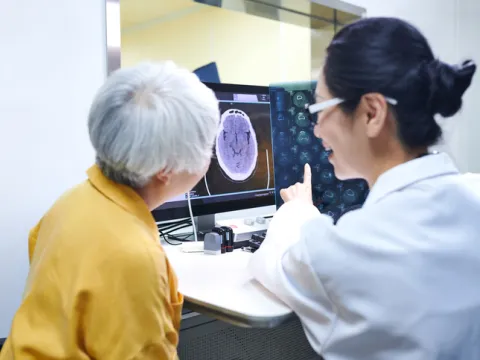- AdventHealth
From stiffness to a small tremor or speech changes, the signs of Parkinson’s disease are diverse and often subtle. Although Parkinson’s disease cannot be cured, early detection of the progressive nervous system disorder can make a dramatic difference in helping control symptoms. Scientists at the AdventHealth Translational Research Institute are working on diagnostic advancements to help more patients before they experience significant nervous system damage.
Kirk Erickson, Ph.D., director of translational neuroscience at AdventHealth’s Central Florida Division, was recently part of a research team that has developed a blood test that detects an indicator of Parkinson’s disease. Based on earlier studies that associated mitochondrial DNA damage with an increased risk of Parkinson’s disease, Erickson, as part of a team led by Duke Health, helped develop an assay, or testing procedure, that successfully measures higher levels of mitochondrial DNA damage in blood cells collected from patients with Parkinson’s disease compared to people without the disease. The newly developed test also identified high levels of the damaged DNA in the blood samples of those with the LRRK2 genetic mutation, which has been associated with an increased risk of the disease as well.
So, what does this mean for those most at-risk for Parkinson’s disease? Once the test becomes available, future patients may experience shorter wait times to be diagnosed with the disease, enabling potentially greater access to medications and other therapies that may ease symptoms and delay progression.
“This breakthrough is a game-changer,” said Erickson. “Currently, a diagnosis of Parkinson’s disease takes time as it is based on a patient’s medical history, along with a physical and neurological exam. This process is compounded by the fact that many symptoms of Parkinson’s disease can go unnoticed as they begin to affect the body’s nervous system. With a simple blood test, our aim is to reduce the time to diagnosis and help patients get the critical care they need to live longer and more comfortably with Parkinson’s disease.”
Erickson added, “Our research continues as we hope to be able to detect the disease even before our patients present with symptoms.”

The Duke Health team that spearheaded this research was led by senior author Laurie Sanders, Ph.D., an associate professor in Duke School of Medicine’s departments of neurology and pathology and member of the Duke Center for Neurodegeneration and Neurotherapeutics. The research received support from numerous international organizations. To read the study, please visit Science Translational Medicine here.
Recent News
AdventHealth East Orlando recently became the first hospital in Florida to earn Advanced Foot & Ankle Surgery Certification from DNV, a worldwide, independent certification body.
With an aging population and increases in the prevalence of neurological conditions like Alzheimer’s disease and dementia, physicians and patients alike continue to seek new tools and approaches to...
In a new article published in the medical journal Age and Ageing, AdventHealth Research Institute’s Dr. Audrey Collins shares the results of a recent study evaluating the impact of exercise on...
The AdventHealth Neuroscience Institute is the first in Florida and one of the first in the country to begin recruiting patients with primary progressive or non-active secondary progressive multiple...
Accurately determining food intake remains a challenge in nutrition research. A new study published in Nature Metabolism and co-authored by Dr. Corbin introduces a metagenomics-powered approach to...
Discover what’s being accomplished in Central Florida to bridge the health gap with Orange County Mayor Jerry Demings and AdventHealth’s Dr. Alric Simmonds.
Breakthrough device offers new hope for stroke survivors struggling with rehabilitation following ischemic stroke
Jennifer Seminerio, MD, recently became one of the first in Florida to use intestinal ultrasound (IUS) to help assess and manage treatment of patients with inflammatory bowel disease (IBD). A non...
The Convergent Hybrid Ablation procedure has been gaining acceptance as an effective treatment option for long-standing persistent atrial fibrillation (AFib) since the CONVERGE trial data published in...
Recently, AdventHealth for Children pediatric orthopedic surgeon Sean Keyes, DO, Katelyn Smith, PA-C, and their team performed their 100th bridge-enhanced anterior cruciate ligament (ACL) repair (BEAR...
Physician leaders from AdventHealth’s emergency department, infectious disease, inpatient, pediatrics and pharmacy teams all collaborated to develop a respiratory virus testing algorithm to assist...
Thoracic surgeon Colleen Gaughan, MD, and her team at AdventHealth Celebration, recently became one of the first in the country to incorporate targeted imaging agent Cytalux (pafolacianine) as part of...












